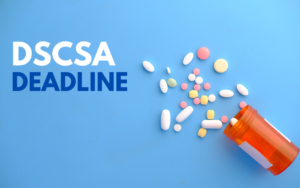The Drug Supply Chain Security Act (DSCSA) is a U.S. law that aims to build an electronic, interoperable system to track and trace certain prescription drugs as they are distributed in the United States. Signed into law in 2013, the DSCSA is a signi&cant milestone for the pharmaceutical industry that is designed to protect consumers from exposure to drugs that may be counterfeit, stolen, contaminated, or otherwise harmful
The Need for DSCSA
The complexity of the drug supply chain makes it vulnerable to various kinds of risks. The market has seen a disturbing uptick in counterfeit drugs, medications stolen from authorized suppliers, and drugs introduced into the supply chain that are not stored or transported under the appropriate conditions. These challenges made it increasingly evident that stronger, more uni&ed legislation was needed to protect both consumers and manufacturers.
What DSCSA Does

Tracking and Tracing
The DSCSA mandates that pharmaceutical companies must provide information at the individual packagelevel about where a drug has been in the supply chain. This enables “track-and-trace” technology, where the path of any given drug can be electronically traced back through its supply chain, thereby identifying any anomalies or illicit activities
Verification
The act requires veri&cation systems for stakeholders in the pharmaceutical supply chain, such as manufacturers, repackagers, wholesale distributors, and dispensers. These parties are responsible for validating the legitimacy of the drugs they distribute, handle, or dispense. This adds an extra layer of security and accountability
Serialization
One of the key elements of DSCSA is serialization. Each pharmaceutical package must carry a unique serial number, which will facilitate more e0cient recalls and better control over the distribution of drugs. This is expected to prevent counterfeit medicines from entering the supply chain.
Licensing
The DSCSA establishes federal standards for the licensing of wholesale distributors and third-party logistics providers (3PLs), to ensure these entities meet certain minimum requirements in terms of security and reliability.
Transparency and Interoperability
Data about drug movement needs to be available in an interoperable electronic system, allowing stakeholders to e0ciently share information. This enables quicker response times in case of recalls or when counterfeit or unsafe medications are discovered
Challenges and Implications

Complexity
Implementation of DSCSA is a highly complex endeavor that involves multiple stakeholders and technological systems. Companies have to make significant investments to upgrade their systems to comply with these new requirements
Timeline
The DSCSA sets forth a 10-year plan for full implementation, with various milestones and deadlines. This long timeline allows the industry to gradually comply with the act’s requirements but also leaves consumers at risk until full compliance is achieved
Global Implications
Many countries have their own regulations concerning drug safety and traceability. DSCSA compliance can therefore be more complicated for companies operating internationally.
Conclusion
The DSCSA represents a monumental e5ort to secure the drug supply chain in the United States. While it is ambitious and complex, its implementation is crucial for protecting the safety of consumers and the integrity of the pharmaceutical industry. Although full compliance will take time and investment, the DSCSA sets the stage for a more secure and transparent drug supply chain




